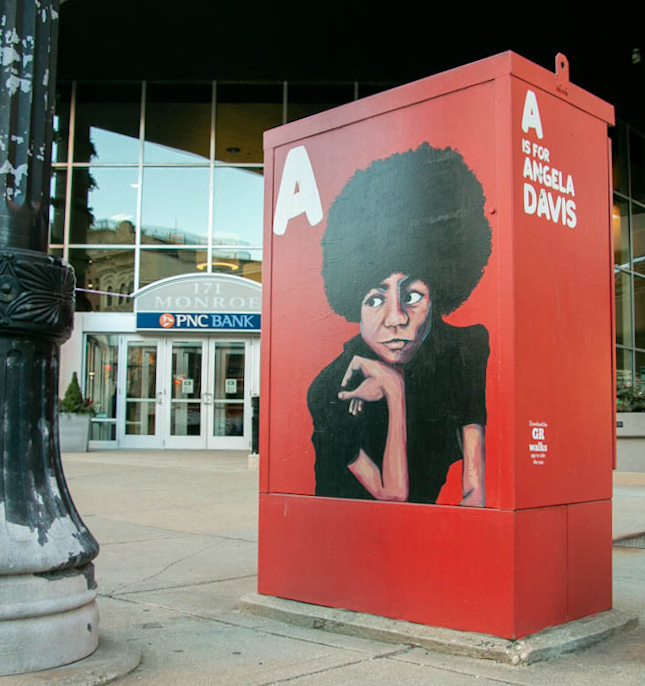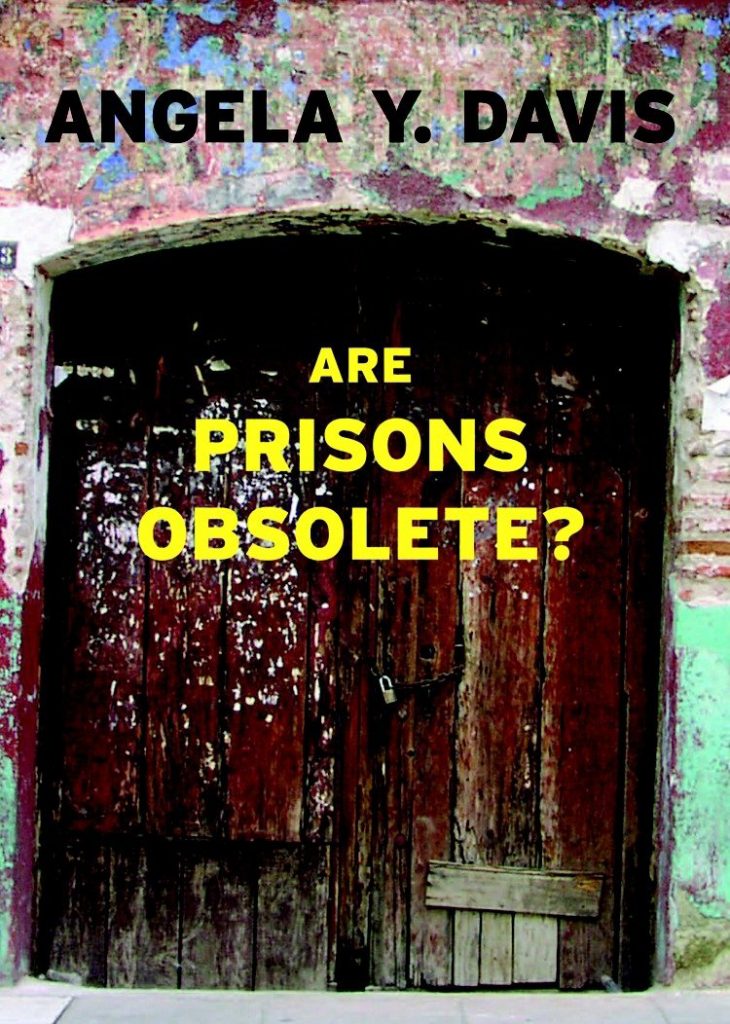By: Liz
I wasn’t sure what to expect reading a book authored by Angela Davis. I hadn’t ventured near her literature before, and all I had known about her before reading this book was that she was an influential activist. Angela Davis’ writing brings attention to details about the prison industrial complex and its history that shouldn’t be missed.
Within the first ten pages, Davis presents a hard statistic to hear, “During my own career as an anti-prison activist I have seen the populations of U. S. Prisons increase with such rapidity that many people in black, Latino, and Native American communities now have a far greater chance of going to prison than of getting a decent education.”
Incarceration is not an old practice. It didn’t exist in the U.S. before the end of slavery. During our book club discussion, it wasn’t well known that prisons are still fairly new in the timeline of the U. S. and, frankly, the world.
The adoption of prisons was to work around slave abolition. When southern slave owners were forced to give their enslaved workers freedom, they were left without labor. The slave owners needed to replace previously enslaved workers so their reign on the economy wouldn’t crash. Paying employees a livable fair wage was not as profitable as slave labor, and these plantation owners were going to find every loophole imaginable to get out of paying their formerly enslaved workers for their labor.

Part of the Rad Women showcase
Painting by Corynn Jackson
Photo by Marin
If only there were an end to profiting off prison labor. Today, more American prisoners are being exploited for their labor than during the first few years following the Emancipation Proclamation. Major brands such as Whole Foods, McDonald’s, Target, IBM, Texas Instruments, Boeing, Nordstrom, Intel, Wal-Mart, Victoria’s Secret, Aramark, AT&T, BP, Starbucks, Microsoft, Nike, Honda, Macy’s, and Sprint are several of many companies that benefit from prison labor.
Why are we supporting a practice with an origin in slavery, and why have we turned a blind eye to slavery today? Slavery isn’t just a history lesson; twenty-first-century slavery has been marketed to look like a normal activity for prisoners.
After reading chapter three, titled Imprisonment and Reform, I brought up prison labor to a family friend. I was explaining the origins and how it made me feel to know that incarcerated people are being exploited for their labor. Their response was, “Well, it’s not like they’re going to do anything else while in jail; they might as well be put to work rather than sit on their butts all day.” The chapters that we read following that discussion talked about how “crime and punishment” shouldn’t be in a marriage with one another, and questioned why we overlook rehabilitation within the prison system. Why are we set on thinking punishment is the only thing to follow crime?
Early in the book, Davis points out the Mississippi Black Codes that were created to incarcerate black people for crimes like being drunk in public, running away from their jobs, or even being accused of carelessly handling money. The Mississippi Black Codes were used to put emancipated black people back on the very plantations they were freed from. However, instead of their lives being monetarily owned, they were now prisoners of the state, and their labor was being used as their punishment for their “crimes.” Davis mentions Mary Ellen Curtin’s study, which found that incarceration rates in Alabama were 99% white before emancipation. Shortly after, the population of incarcerated individuals became disproportionately black.
“During my own career as an anti-prison activist I have seen the populations of U. S. Prisons increase with such rapidity that many people in black, Latino, and Native American communities now have a far greater chance of going to prison than of getting a decent education.”
Angela Davis
Davis also brings up the racist tendencies of white people who used black-face following emancipation to get away with a crime. She makes sure to point out that those tactics have never gone away. Unfortunately, it is common for privileged people to blame black people for their crimes because our system is built on the idea that black people are “inherently criminal and, in particular, prone to larceny.” Without the Mississippi Black Codes, this idea would not be as ingrained into our society. This stigma needs to end.
Angela Davis writes in a way that informs the reader of our country’s truth and explains how devastating our treatment of prisoners has been and still is. Yet, she writes with optimism that change is possible. Optimism is not too common in political literature, especially not when the writing is about something as awful as the prison industrial complex. Davis is not a “black pill” writer. She is inspiring and has a voice that radicalizes.
I implore all who read this article to read Angela Davis’ work, fully comprehend her words, and become radicalized. The prison industrial complex is fully aware of its inhumane practices. Yet, it thrives because ordinary people are unaware of how multifarious prisons are. It’s not the fault of ordinary people; the system doesn’t want people to know what goes on behind closed doors. We must educate our neighbors and read literature from activists and individuals who are directly impacted by the prison industrial complex. And, to answer Angela Davis: yes, prisons are obsolete.

